Crunchbase vs Apollo compared: Selecting the optimal platform for your business insights
- 01Crunchbase vs Apollo.io: overview
- 02What's the difference between Crunchbase and Apollo.io?
- 03Crunchbase pros and cons
- 04Apollo.io pros and cons
- 05Crunchbase compared to Apollo.io
- 06Apollo.io compared to Crunchbase
- 07Features comparison
- 08Crunchbase vs Apollo.io: Which is the best for your business?
- 09Promotions on Prospecting software
- 10Alternatives to Crunchbase & Apollo.io
Access up to $1,176 savings on Crunchbase & $4,800 on Apollo.io
Crunchbase
20% off for 1 year
Access up to $1,176 savings on Crunchbase & $4,800 on Apollo.io
Business intelligence and data analytics have become more accessible than ever with the emergence of platforms like Crunchbase and Apollo. These tools offer a wide array of applications, from simplifying market research to empowering data-driven decision-making. However, with the plethora of options available, selecting the ideal solution for your business can be a challenging task.
In this comparative analysis, we will delve into the key features, strengths, weaknesses, and crucial distinctions between Crunchbase and Apollo. By the end of this exploration, you will be equipped to make an educated choice regarding which platform aligns most effectively with your business objectives and data analysis requirements. Let's get started!
Crunchbase vs Apollo.io: overview
Crunchbase and Apollo stand as prominent contenders in the realm of business intelligence and data enrichment platforms, each offering its own set of unique features tailored to cater to a wide range of business needs.
Crunchbase is renowned for its comprehensive business data and user-friendly interface, making it accessible for individuals and organizations seeking market insights, competitor analysis, and investment opportunities. On the other hand, Apollo provides a more robust suite of sales engagement and lead generation tools. It offers features like email tracking, automated follow-ups, and CRM integration, empowering sales teams to streamline their outreach efforts and drive revenue growth effectively.
In this Crunchbase vs. Apollo comparison, we will delve into the specific functionalities, strengths, and weaknesses of each platform, enabling you to make an informed decision about which solution best aligns with your business's data-driven needs.
What's the difference between Crunchbase and Apollo.io?
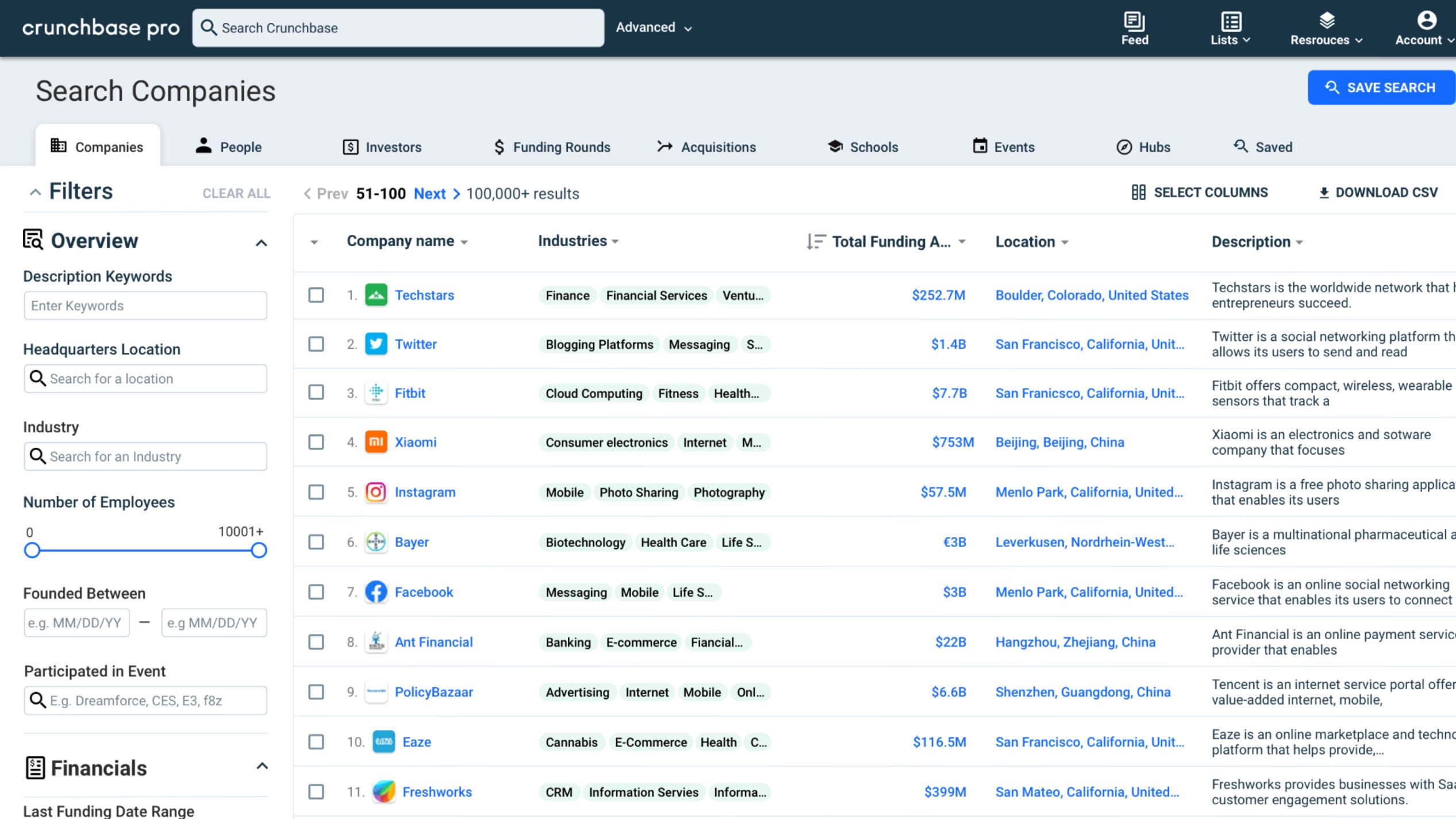
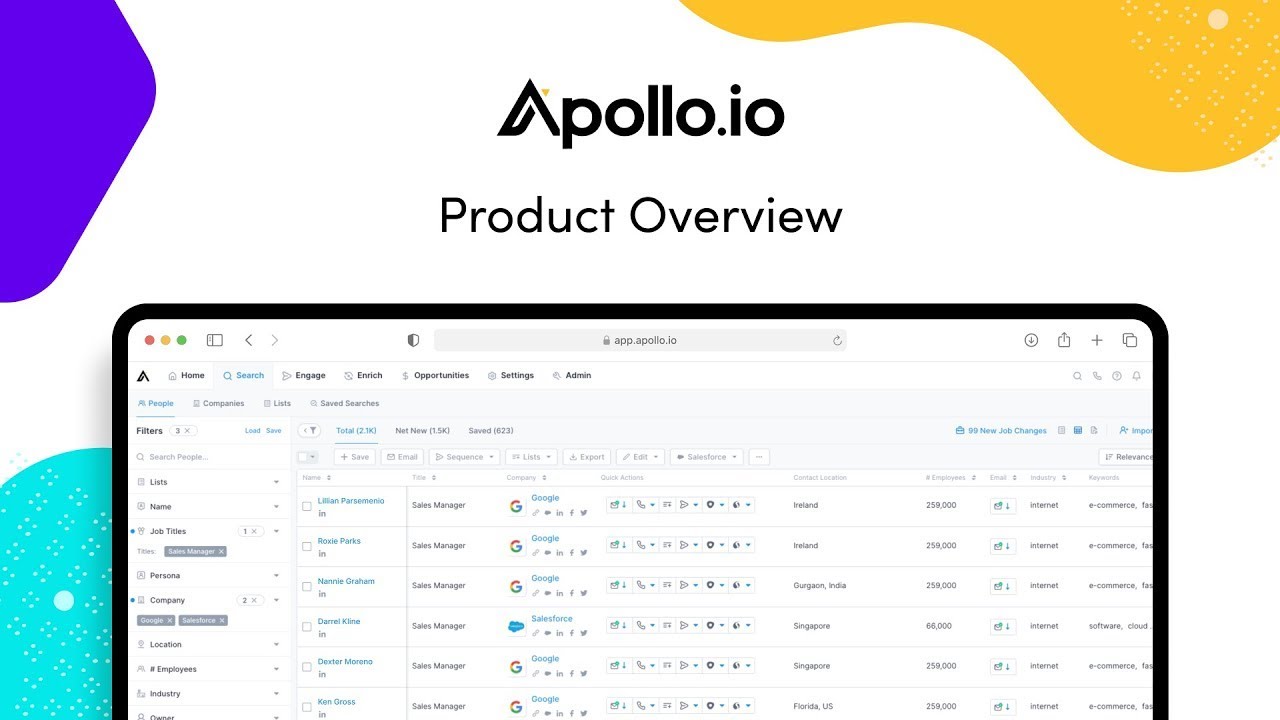
Crunchbase and Apollo are two prominent platforms that cater to businesses' data needs, yet they possess distinct characteristics and serve diverse purposes within the realm of business intelligence and data enrichment.
Crunchbase, often regarded as an authoritative repository of business insights, stands out for its extensive database comprising comprehensive information related to startups, investors, and overarching market trends. This wealth of data empowers users to gain profound insights into various aspects of the business landscape. For investors and market researchers, Crunchbase becomes an invaluable resource, offering in-depth examinations into funding rounds, industry trends, and other pertinent aspects. Crunchbase's strength lies in its data-driven approach, which provides a panoramic view of the business world.
On the other hand, Apollo.io distinguishes itself as a robust sales engagement platform, offering a holistic approach to the sales process. Its value proposition extends beyond just providing sales intelligence; it seamlessly integrates functionalities such as outreach, lead scoring, and automation, creating a cohesive workflow. This integrated methodology empowers Apollo.io to deliver actionable insights while concurrently optimizing operations for sales teams. Notably, users appreciate Apollo.io's user-friendly interface, designed intuitively for simplified navigation and feature utilization.
The primary difference between Crunchbase and Apollo.io lies in their fundamental objectives. Apollo.io excels in elevating sales engagement to a higher level, while Crunchbase shines in furnishing an exhaustive array of business insights. While Crunchbase emphasizes data collection and analysis, Apollo.io focuses on enhancing lead management, outreach, and the overall sales process.
The choice between Crunchbase and Apollo.io depends on one's specific strategic objectives within the ever-evolving realms of business and technology. If the overarching priority is data-driven decision-making, Crunchbase is the tool of choice. Conversely, for those looking to optimize their sales endeavors through a comprehensive sales engagement platform, Apollo.io proves to be the ideal solution.

20% off for 1 year on Crunchbase
Get 20% off for 1 year on Crunchbase and up to $1,176 savings with Secret.
Crunchbase pros and cons
What are the advantages of Crunchbase?
- Comprehensive business data: Crunchbase offers a vast database of company profiles, funding information, and industry insights, making it a valuable resource for market research and competitive analysis.
- User-friendly interface: Its intuitive and user-friendly interface allows easy navigation and data retrieval, making it accessible to users with varying levels of expertise.
- Powerful search functionality: Crunchbase provides advanced search filters and query options, enabling users to pinpoint specific companies, investors, or funding rounds efficiently.
- Customizable alerts: Users can set up customized alerts for updates on companies or industries of interest, ensuring they stay informed about relevant developments.
- Integration options: Crunchbase offers integration with popular CRM systems and tools, streamlining data access and workflow for businesses.
What are the disadvantages of Crunchbase?
- Limited free access: While Crunchbase provides free access to some data, more advanced features and comprehensive information often require a premium subscription, which can be expensive for small businesses or individuals.
- Data accuracy: While generally reliable, Crunchbase's data may not always be up-to-date or completely accurate, which can be a concern for critical business decisions.
- Learning curve: The platform may have a learning curve for users unfamiliar with data analysis, as harnessing its full potential may require some training.
- Restricted export features: Exporting data from Crunchbase can be limited, which may hinder users who wish to manipulate or analyze the data externally.
- Competitor pricing: In comparison to similar platforms, Crunchbase's pricing plans can be on the higher side, potentially posing a budget challenge for some users.
Compare Crunchbase to other tools
Apollo.io pros and cons
What are the advantages of Apollo.io?
- Sales engagement features: Apollo offers a robust set of sales engagement tools, including email tracking, automated follow-ups, and cadence creation, helping sales teams streamline their outreach and increase productivity.
- Lead generation: The platform provides effective lead generation capabilities, allowing users to find and target prospects based on various criteria, enhancing the efficiency of sales efforts.
- Integration options: Apollo integrates seamlessly with popular CRM systems, like Salesforce and HubSpot, and email marketing tools, facilitating a unified and efficient sales workflow.
- User-friendly interface: Apollo is known for its intuitive and user-friendly interface, making it accessible to both sales professionals and those new to sales engagement tools.
- Analytics and reporting: The platform offers valuable insights through analytics and reporting features, enabling users to track the effectiveness of their outreach efforts and make data-driven decisions.
What are the disadvantages of Apollo.io?
- Pricing complexity: While competitive, Apollo's pricing structure can be complex, with various tiers and add-ons, potentially making it challenging for users to choose the most suitable plan.
- Learning curve: Despite its user-friendly interface, Apollo's advanced features may require training and time to master fully.
- Data quality: The accuracy and completeness of contact information and lead data can vary, potentially leading to issues in lead generation and outreach.
- Limited customization: Some users may find that Apollo's level of customization for email templates and cadences is not as extensive as they would prefer.
- Competitive landscape: The sales engagement and lead generation market is highly competitive, and while Apollo excels in many areas, users may want to compare it with other options to ensure it meets their specific needs.
Compare Apollo.io to other tools
Crunchbase compared to Apollo.io
Crunchbase and Apollo are prominent platforms, each catering to distinct business needs. Crunchbase excels in providing comprehensive business data and industry insights, making it a valuable tool for market research and competitive analysis. Its user-friendly interface and search functionality enhance data accessibility.
In contrast, Apollo shines in sales engagement and lead generation, offering email tracking, automated follow-ups, and CRM integration to streamline sales efforts. While Crunchbase is an excellent resource for data-driven decision-making, Apollo empowers sales teams with powerful tools to drive revenue. Businesses must weigh their priorities when choosing between these platforms to align with their specific objectives.
Is Crunchbase better than Apollo.io?
Determining whether Crunchbase is better than Apollo depends on your specific needs. Crunchbase excels in providing comprehensive business data and industry insights, making it valuable for market research. In contrast, Apollo focuses on sales engagement and lead generation, offering tools like email tracking and automated follow-ups for sales teams.
If data-driven decision-making is your priority, Crunchbase is a solid choice. However, if you aim to streamline sales efforts and drive revenue growth, Apollo's features may be more suitable. It's essential to evaluate your objectives and requirements to determine which platform aligns better with your business goals.
What is Crunchbase best used for?
Crunchbase is best used for gathering comprehensive business data and industry insights. It serves as a valuable resource for market research, competitor analysis, and investment opportunities. With its extensive database and user-friendly interface, it simplifies the exploration and extraction of critical information.
Whether you're seeking to identify emerging trends, evaluate potential business partners, or track funding rounds, Crunchbase provides a wealth of data to support informed decision-making. It's particularly beneficial for businesses and professionals who require up-to-date and reliable information to stay competitive and make strategic choices in various industries.
Can Crunchbase replace Apollo.io?
While Crunchbase and Apollo are both valuable tools, they serve different purposes and may not be direct replacements for one another. Crunchbase specializes in providing comprehensive business data and industry insights, ideal for market research and competitor analysis.
On the other hand, Apollo focuses on sales engagement and lead generation, offering features like email tracking and automated follow-ups for sales teams. While Crunchbase is crucial for data-driven decision-making, Apollo streamlines sales efforts to drive revenue growth. Depending on your specific needs, you may use both tools in tandem to complement different aspects of your business strategy, but they are not interchangeable in their primary functions.
Is Crunchbase cheaper than Apollo.io?
The cost comparison between Crunchbase and Apollo depends on your specific requirements and usage. Crunchbase’s pricing offers a tiered model, starting with a lower entry-level plan but can become expensive as you require more advanced features and data access. Apollo, on the other hand, provides transparent pricing options suitable for various business sizes.
To determine which is cheaper for your needs, it's essential to evaluate the specific features and data access required for your business. Both platforms have different pricing structures, making it essential to consider your budget and the features that align with your goals when making a decision.
Is there a better Prospecting software than Crunchbase?
When assessing the landscape of business intelligence and data enrichment tools, it's crucial to contemplate whether there's a better software than Crunchbase that aligns with your specific needs.
Several alternatives to Crunchbase in this domain include Apollo, Clearbit, ZoomInfo, and InsideView. The choice of a data enrichment platform depends on factors such as the depth of data required, integration capabilities, pricing structure, and data accuracy. While Crunchbase is renowned for its extensive business data, exploring alternatives can help you find a solution that better suits your business's data-driven objectives and budget constraints. It's essential to evaluate these options to determine which one aligns best with your specific requirements.
20% off for 1 year on Crunchbase
Get 20% off for 1 year on Crunchbase and up to $1,176 savings with Secret.
Apollo.io compared to Crunchbase
Apollo and Crunchbase are powerful tools in the realm of business intelligence and data enrichment. Apollo specializes in sales engagement and lead generation, offering features like email tracking, automated follow-ups, and CRM integration to boost sales efficiency.
In contrast, Crunchbase is renowned for its comprehensive business data and industry insights, serving as a valuable resource for market research and competitor analysis. While Apollo empowers sales teams, Crunchbase supports data-driven decision-making. The choice between these platforms hinges on your specific business needs: sales optimization and lead generation with Apollo or market insights and data research with Crunchbase.
Is Apollo.io better than Crunchbase?
Determining whether Apollo is better than Crunchbase depends on your specific objectives. Apollo excels in sales engagement and lead generation, offering tools like email tracking, automated follow-ups, and CRM integration, making it invaluable for sales teams aiming to streamline their outreach and drive revenue.
On the other hand, Crunchbase is renowned for its comprehensive business data and industry insights, making it a vital resource for market research and competitor analysis. The choice between the two hinges on your primary focus: sales optimization and lead generation with Apollo or data-driven decision-making and market research with Crunchbase. Both are valuable tools in their respective domains.
What is Apollo.io best used for?
Apollo is best used for optimizing sales engagement and lead generation processes. This versatile platform empowers sales teams with a suite of tools, including email tracking, automated follow-ups, and CRM integration. It facilitates targeted prospecting, helping users identify and connect with potential customers more effectively.
Apollo's emphasis on sales efficiency makes it an ideal choice for organizations seeking to streamline their outreach efforts, increase conversion rates, and drive revenue growth. Whether you're a sales professional, a business owner, or part of a sales team, Apollo provides the capabilities needed to enhance your sales strategies and achieve measurable results in a competitive market.
Can Apollo.io replace Crunchbase?
Apollo and Crunchbase serve different primary purposes, and as such, they may not be direct replacements for one another. Apollo is primarily designed for sales engagement and lead generation, providing tools like email tracking and CRM integration to enhance sales efficiency. In contrast, Crunchbase excels in offering comprehensive business data and industry insights, valuable for market research and competitor analysis.
While both platforms provide data-related services, their core focuses differ. To determine whether Apollo can replace Crunchbase, consider your specific needs: sales optimization and lead generation with Apollo or data-driven decision-making and market research with Crunchbase.
Is Apollo.io cheaper than Crunchbase?
The cost comparison between Apollo and Crunchbase depends on your specific requirements and usage. Apollo’s pricing offers transparent options suitable for various business sizes, making it accessible for many.
On the other hand, Crunchbase operates on a tiered pricing model, with more advanced features and data access often coming at a higher cost. To determine which is cheaper for your needs, it's crucial to evaluate the specific features and data access required for your business. Both platforms have different pricing structures, making it essential to consider your budget and the features that align with your goals when making a decision.
Is there a better Prospecting software than Apollo.io?
When exploring alternatives to Apollo in the realm of sales engagement and lead generation, it's essential to assess whether there's a software that better suits your specific sales and prospecting needs.
Several notable alternatives to Apollo in this domain include Outreach, HubSpot Sales Hub, SalesLoft, and Zoho CRM.
Selecting the ideal sales engagement platform depends on factors such as the depth of sales automation required, integration capabilities, pricing structures, and user interface preferences. While Apollo offers robust sales tools, other platforms may excel in specific areas like email outreach, CRM functionality, or lead management. Evaluating these alternatives will help you determine which one aligns best with your sales strategy and objectives.
50% off the annual Basic or Professional plan for 1 year (Up to 5 seats) on Apollo.io
Get 50% off the annual Basic or Professional plan for 1 year (Up to 5 seats) on Apollo.io and up to $4,800 savings with Secret.
Features comparison
Both Crunchbase and Apollo are Efficient at Accessing Real-Time Company and Contact Data

Both Apollo and Crunchbase excel in maintaining extensive databases containing a wealth of company and contact information. This shared strength empowers businesses with access to up-to-date and comprehensive data on their target prospects.
For instance, Apollo's database includes valuable insights on companies, including their size, industry, location, and key decision-makers, enabling businesses to identify and engage with the right leads effectively. Users can leverage this data to personalize outreach, increasing the chances of conversion.
Similarly, Crunchbase's vast database provides valuable information about startups, funding rounds, investors, and market trends. This wealth of data assists businesses in making informed decisions, identifying potential investment opportunities, and staying updated on industry developments.
Crunchbase's Versatile Functionality Surpasses Apollo's Specialization

When evaluating the range of functionalities, Crunchbase stands out with its versatility. Crunchbase offers users a comprehensive suite of tools across various pricing plans. Users can search, track, and monitor companies of interest, facilitating faster deal closures, streamlined prospecting, and equipping teams with comprehensive tools.
In contrast, Apollo.io, while strong in lead identification, management, and outreach, appears to specialize in these areas and may not offer the same breadth of functionalities as Crunchbase. Apollo.io's primary focus is on sales engagement and lead management, which makes it an excellent choice for sales teams but may not cater to the diverse needs that Crunchbase addresses.
Apollo.io's Superior User Experience Outshines Crunchbase

In the realm of user experience, Apollo.io undoubtedly outshines Crunchbase. Apollo.io's user-friendly interface, characterized by intuitive design and streamlined navigation, provides a seamless experience for its users. For instance, when users search for specific leads or companies, Apollo.io's search functionality offers real-time suggestions, making it easy to find relevant information quickly.
In contrast, Crunchbase, while a valuable resource for business insights, may be considered less user-friendly due to its data-intensive nature. It lacks the same level of intuitive design and personalized dashboards, which can lead to a steeper learning curve for users. Crunchbase's focus on extensive data may sometimes overwhelm users seeking a more straightforward experience.
Apollo.io Excels in Integration Capabilities, Outpacing Crunchbase
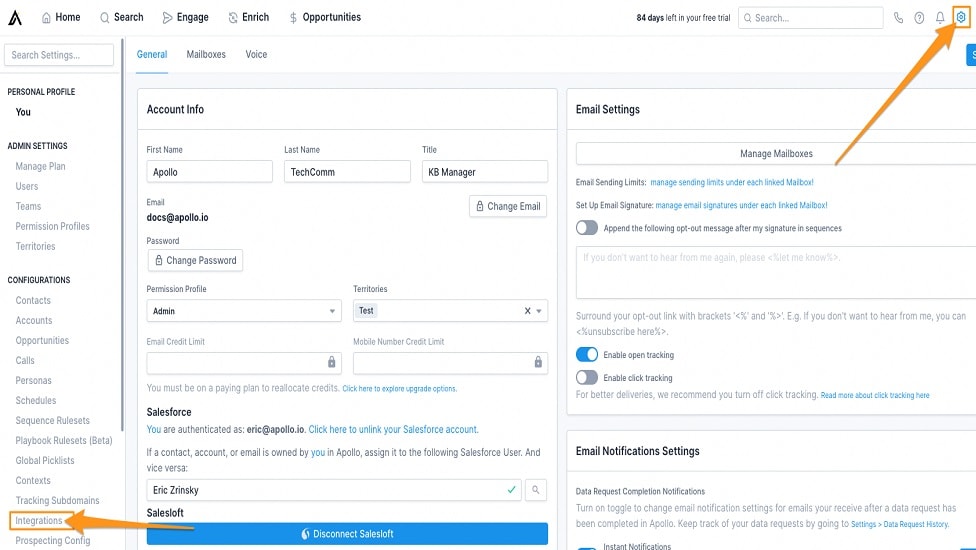
When it comes to integration capabilities, Apollo.io stands out as the frontrunner. Apollo.io boasts an impressive track record of seamless integration with a wide array of SaaS platforms. This extensive interoperability empowers users to effortlessly incorporate Apollo.io into their existing tech stack. Whether it's SalesForce, HubSpot, Slack, or numerous other tools, Apollo.io offers comprehensive integration options, enabling businesses to streamline their workflows effectively.
For example, sales teams can integrate Apollo.io with their SalesForce CRM to enhance lead management and sales automation. Marketing teams can sync Apollo.io with HubSpot for a more synchronized approach to customer engagement. This adaptability and versatility in integration possibilities make Apollo.io a valuable asset for businesses with diverse SaaS toolsets. Conversely, while Crunchbase does provide some integration options with popular tools like Google Sheets and Excel, it lacks the same breadth and depth in integration capabilities as Apollo.io.
Apollo.io Takes the Lead in Lead Management Capabilities Over Crunchbase

When it comes to lead management, Apollo.io takes a significant lead over Crunchbase with its comprehensive set of features. Apollo.io offers a wide range of tools that empower businesses to effectively manage their leads. For instance, users can easily assign leads to different team members, ensuring that each lead receives personalized attention. Furthermore, Apollo.io enables users to set reminders for follow-up actions, preventing leads from slipping through the cracks. This proactive approach to lead management ensures that potential opportunities are maximized.
Apollo.io also excels in tracking leads' progress through the sales pipeline. Users can monitor each lead's journey, from initial contact to conversion, providing valuable insights into the effectiveness of their sales strategies.
In contrast, Crunchbase primarily focuses on data collection and analysis, which doesn't explicitly extend to lead tracking. While Crunchbase offers valuable business insights, it lacks the specific tools and features that make lead management efficient and streamlined.
Crunchbase's Advanced Data Gathering Technology Surpasses Apollo's Capabilities
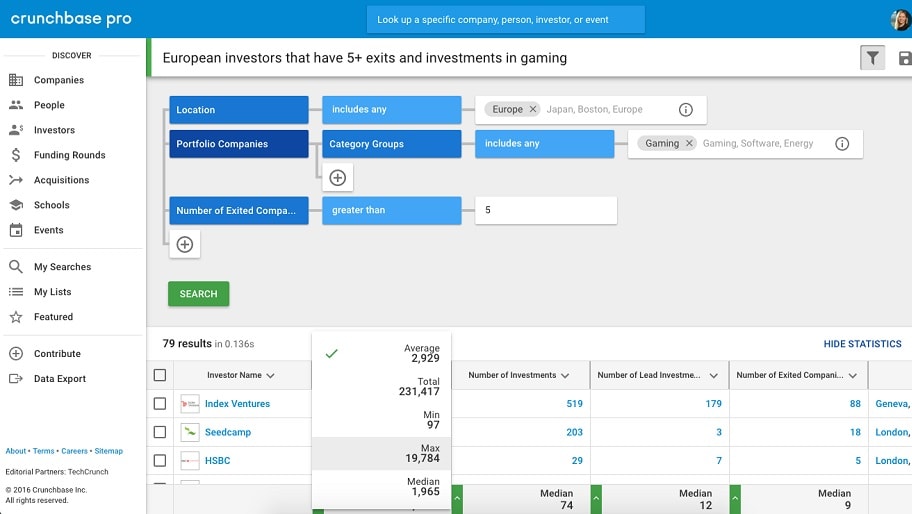
When it comes to data gathering, Crunchbase employs an impressive arsenal of over 400 algorithms to search, verify, and compile information from a vast network of over 2,000 reputable news publications. This sophisticated use of AI and machine learning technology ensures not only the efficiency of data collection but also a high level of accuracy. Crunchbase's commitment to utilizing cutting-edge technology in data sourcing sets it apart from Apollo, which doesn't highlight similar advanced AI and machine learning capabilities.
For example, Crunchbase's algorithms can aggregate real-time data about startups, funding rounds, mergers, and acquisitions, providing users with up-to-the-minute insights into the business landscape. This level of data accuracy and timeliness can be invaluable for investors, market researchers, and businesses looking to make informed decisions.
In contrast, while Apollo.io offers valuable sales engagement features, its data gathering capabilities may not match the depth and precision of Crunchbase's approach. Apollo.io focuses more on the sales process and lead management, with less emphasis on the extensive data collection and validation that Crunchbase excels at.
Apollo.io's Advanced Email Personalization Outshines Crunchbase
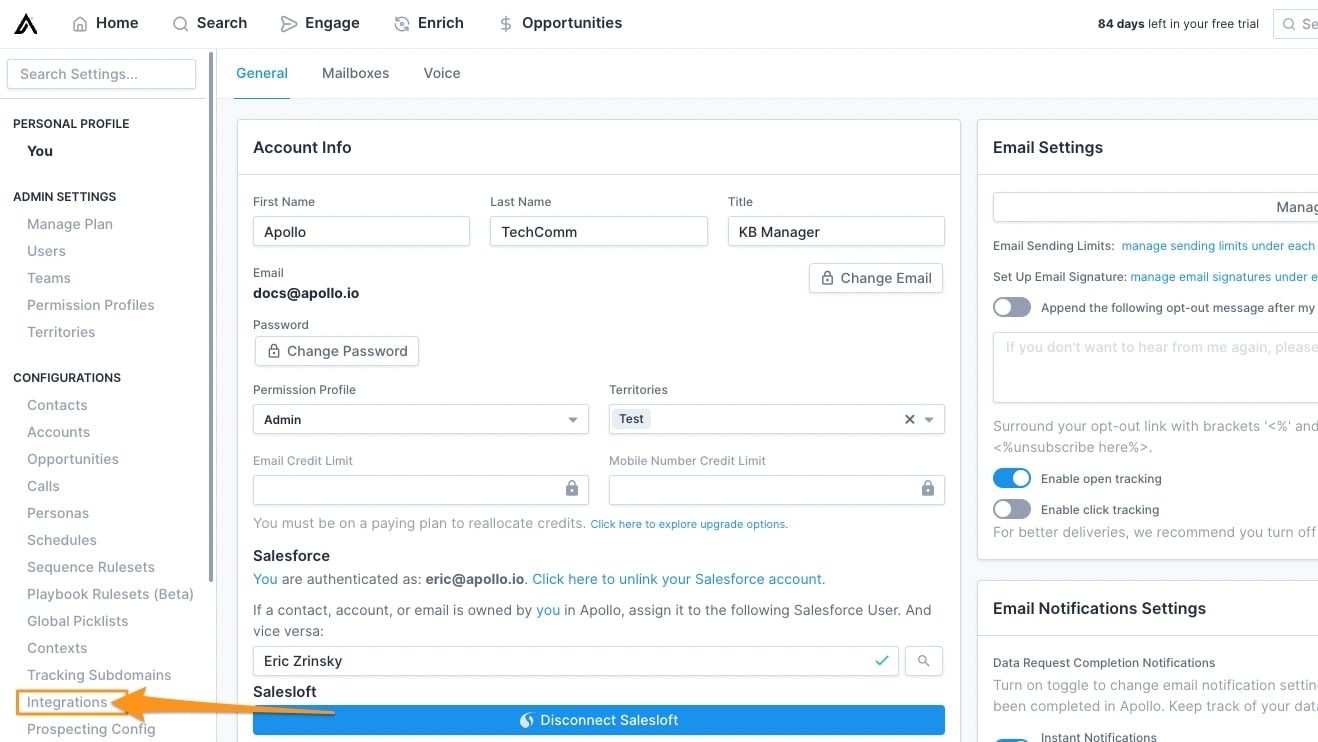
In the realm of email outreach, Apollo.io outshines Crunchbase with its advanced email personalization features. Apollo.io empowers users to create personalized email templates that incorporate merge tags and dynamic content placeholders. This functionality allows for highly tailored and customized outreach to individual prospects, increasing the likelihood of engagement and conversions.
In contrast, while Crunchbase provides tools for prospect discovery and outreach, it doesn't explicitly mention features for personalizing outreach to the same extent as Apollo.io. Crunchbase's primary focus appears to be on data collection and analysis, rather than the nuanced personalization of email communication.
Subscribe to our newsletters.
No FOMO here. Stay up-to-date on all the latest deals and news with our monthly newsletter straight to your inbox like 118,000+ entrepreneurs (+ Get 10% off on on our Premium Membership!)
Crunchbase vs Apollo.io: Which is the best for your business?
Crunchbase is the best tool for you if:
- You are an investor or market researcher seeking comprehensive data on startups, funding rounds, and industry trends.
- Your business requires a versatile tool offering prospecting, team collaboration, and data tracking features.
- Data accuracy and extensive algorithms are essential for your decision-making processes.
- You value a broad range of integration options to streamline your workflow.
- You need a tool that focuses on data collection and analysis over lead management and sales engagement.
Apollo.io is the best tool for you if:
- You are a sales professional looking to enhance lead identification, management, and outreach for your sales team.
- Personalized email templates and dynamic content are crucial for your outreach strategies.
- You prioritize a user-friendly interface and seamless navigation.
- Integration with existing SaaS platforms, like Salesforce or HubSpot, is essential for your workflow.
- Your primary focus is on optimizing sales endeavors and actionable insights rather than in-depth data analysis.

20% off for 1 year on Crunchbase
Get 20% off for 1 year on Crunchbase and up to $1,176 savings with Secret.
Alternatives to Crunchbase & Apollo.io
Promotions on Prospecting software
Start saving on the best SaaS with Secret.
Secret has already helped tens of thousands of startups save millions on the best SaaS like Crunchbase, Apollo.io & many more. Join Secret now to buy software the smart way.















